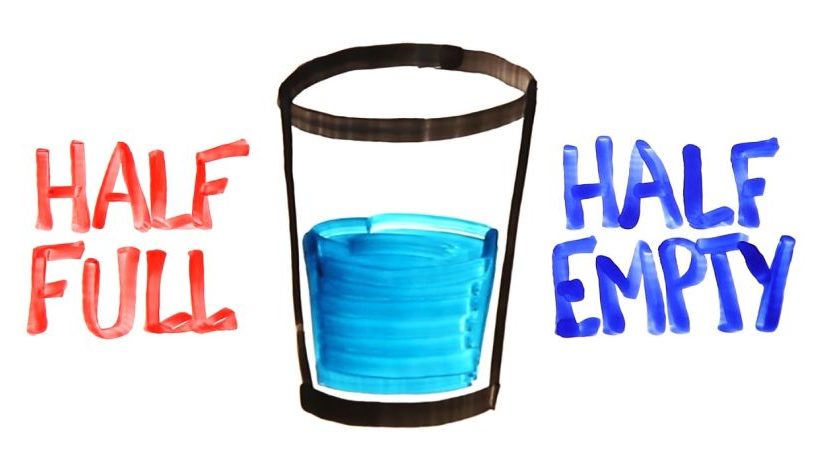Glass is half empty!
“Pain is inevitable…”
Words are foundations to our well-being. Language plays a very important role in how we think, feel and behave. It is through language we make sense of ourselves and the world around us. It is through language we construct truths and our reality. We respond to words in positive, negative or indifference. Words can make us feel good or affect us, in that sense words carry some energy. Over time our psyche is conditioned to respond to words with certain affect. The response is split either as a good feeling or a bad feeling.
This conditioning occurs even before we understood words, in a sense this understanding of good and bad feeling is pre-verbal, the genesis of which lies within the very first relationship dyad, that of the infant and the mother, especially the mother’s breast. The experience that the infant has in relation to this object, that is, the mother’s breast is crucial in the psychological development of the person in later life. This interaction could either represent a good experience or a bad one, which is, a good breast or a bad breast. The good breast is one which is available and nourishes and triggers good feelings, whereas, the bad breast is the one which is unavailable and triggers bad feelings. The bad breast triggers the persecutory feelings, that is, attack on self and the breast, which could eventually lead to paranoia and an insecure attachment with the primary object. With the good breast or ‘good enough’ breast a containing environment is created and the infant develops a secure attachment with the primary figure. The infant desires to own, control and possess the mother and more complex feelings begin to take shape as the realisation of a presence of the third emerges in the dyad. Feelings of guilt, jealousy, envy and hate begin to take shape in the triad. Over time these experiences are internalised and remain as templates in our mind. Later experiences can reshape these early patterns but the influence of the early experiences or objects continue to exert a strong influence on later experiences. Due to association of the good experiences and bad experiences respectively, our attention and perception are conditioned in a particular pattern. These processes of attention and perception play a significant role in what we pay attention to, how we see and perceive ourselves, others and world around us.
Which of these thoughts come more naturally to you?
- “I have not received things in life that I should have”
- “I trust good things happen to me “
Gradually, as we learn to communicate and these experiences are shaped by words, language and social interactions. We see and perceive the world through the lens of our early infantile experiences. Words become containers of these experiences. We pay attention to particular truth and we assert the truth through language and we affirm the reality with words. For example, the classic analogy of the glass which is half full, half empty. One can pay attention to the part which is half empty and assert that the glass is half empty and it won’t be false, that is one truth of the reality. Someone else can pay attention to the part which is half full and assert that the glass is half full and that won’t be false either, since that is also the truth of this reality. Truth is plural and not singular in that sense.
Glass is half full!
Someone wise said, “pain is inevitable… but suffering is optional!”
Our feelings and behaviours largely depend on what we focus on. If we focus on the lack, we feel deprived, that is, the experience of the bad breast, which provokes anxiety. If we focus on the aspect which is available, or hopeful of it, it provokes secure feelings, the experience of the good nourishing breast. The attention to the lack or the abundance largely depends on our earlier infantile experiences. ‘Negative’ means paying attention to the lack, the half empty, something which is not there, and ‘positive’ means paying attention to the aspect which is there, the half full. Now it depends on our condition what we pay attention to, the lack or the available, the negative or the positive, the half empty or the half full.
The glass is half full and the glass is half empty both the assertions are true. You won’t be committing a crime if you want to assert that glass is half empty, nor will you if you assert that it is half full. It only depends you want to assert. Focusing on the half empty may make you feel dejected, whereas, focusing on the half full may make you feel hopeful. Hence, now the trigger to this psychic response, good feelings or bad feelings, is your attention. Therefore, doing affirmation work is primarily training your attention and perception. We do it consciously to with words to train our unconscious mind. At the same time, realizing that it is the same object that nourishes you, which you hate. The realization that it is the same glass which is both half full and half empty!
How to make an online appointment at Healing Studio:
You will have to fill a small intake form, please go through this page intake page, it contains information about, fees, duration, mode of fee payment etc: http://www.healingstudio.in/therapy-intake/
Call: +91 702 144 0454 or WhatsApp to make an appointment!

